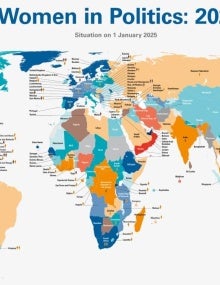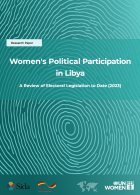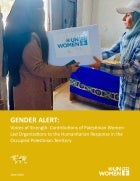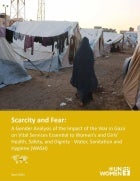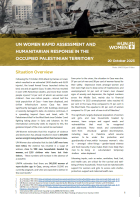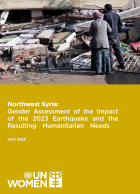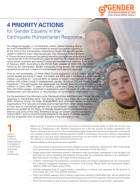1 - 20 of 20 Results
Date:
The “Women in politics: 2025” map, created by the Inter-Parliamentary Union (IPU) and UN Women, presents new data for women in executive positions and national parliaments as of 1 January 2025.
Date:
Engaging Libyan women in political processes enables them to drive meaningful societal change. Equitable authority sharing fosters a collaborative environment for addressing challenges. Women's participation shapes their community roles and inspires others.
Date:
The war on Gaza has become one of the world’s most brutal man-made humanitarian crises. The war has directly impacted more than 2.2 million people, resulting in an unprecedented number of civilians killed, alongside overwhelming displacement.
Date:
As the war on Gaza reached its six-month mark, it continues to be a war on women. According to UN Women estimates, more than 10,000 women have been killed to date, among them an estimated 6,000 women who left 19,000 orphan children behind.
Date:
UN Women has been documenting the experiences of women in Gaza in a series of gender alerts that look at various aspects of how the war is impacting the daily lives of women and girls, including food, water, shelter, health, and protection. This new alert focuses on water, sanitation, and hygiene (WASH) services, which are integral to women’s health, dignity, safety, and privacy.
Date:
This document provides an overview of the situation in Gaza and articulates UN Women’s work as part of its six-month multisectoral response to the crisis.
Date:
Following the 7 October 2023 attack by Hamas on Israel, which resulted in an estimated 1,300 deaths and 4,500 injuries, the Israeli Armed Forces launched strikes by land, sea, and air against Gaza.
Date:
A series of powerful earthquakes measuring 7.7 on the Richter scale struck southern Turkey and northern Syria on February 6th, resulting in widespread devastation. The epicenter was near the Turkey-Syria border, and the region has experienced over 1,206 aftershocks. The impact of the earthquake has been particularly severe in Aleppo, Hama, Idleb, and Lattakia Governorates, worsening the existing dire humanitarian situation.
Date:
Gender Equality in the Earthquake Humanitarian Response for North West Syria
Date:
This newsletter captures the latest updates on the implementation of the Women’s Peace and Humanitarian Fund (WPHF) in Lebanon. The newsletter includes the key highlights and achievements of the WPHF programme partners' towards enhancing women’s participation in the Beirut Port Explosion’s response and recovery process.
Date:
This newsletter captures the latest updates on the implementation of the Women’s Peace and Humanitarian Fund (WPHF) in Lebanon. The newsletter includes the key highlights and achievements of the WPHF programme partners' towards enhancing women’s participation in the Beirut Port Explosion’s response and recovery process.
Date:
UN Women and OCHA jointly examine the extent to which issues of gender equality were factored into various stages of the 2020 Flash Appeal in response to the Beirut port explosions.
Date:
This report presents the results of the independent evaluation of UN Women’s ‘Strengthening the Resilience of Syrian Women and Girls and Host Communities’ (“Madad”) programme and offers lessons and recommendations for future programming on gender equality and women’s empowerment. The Synthesis report includes country specific annexes for Iraq, Jordan and Turkey.
Date:
This brief shines a light on the critical role of women’s leadership in responding to COVID-19 and preparing for a more equitable recovery. Across the globe, women are at the helm of institutions carrying out effective and inclusive COVID-19 responses, from the highest levels of decision-making to frontline service delivery.
Date:
This guidance note seeks to assist policy and programme actors to conduct rapid assessments that are fully responsive to gender and intersectionality. It is focused on three critical steps: the development of assessment surveys/questionnaires, their implementation, the analysis of findings and resulting recommendations.
Date:
This document outlines UN Women’s response plan for the 2020 Beirut Plan – a plan that works across the humanitarian-development-peace and security nexus to provide immediate relief to those in need, and to ensure that longer term recovery and reconstruction both addresses the needs of women and girls, and promotes gender equality.
Date:
Crisis management or emergency situations such as COVID-19 can have serious impacts on the lives of women and girls, if gender dimensions are not considered. Issues such as care work, economic autonomy, physical or sexual violence, women's participation in decision-making, disaggregation of data by sex, gender analysis, and irregular migration are just some of the areas of concern that must be part of an effective response to the health crisis that the world is going through right now.
Date:
Humanitarian needs continue to grow with nearly 132 million people in need of assistance in 2018, due to conflict, persecution, and natural disasters. The average humanitarian crisis now lasts more than nine years, and periods of forced displacement more than seventeen. Women and girls who make up approximately half of this 132 million face daily discrimination and violence. The breakdown of protection mechanisms and destruction of essential services and economic structures in crises hits the already marginalized hardest.
Date:
This report represents the conclusions of two sessions held in Tunis, Tunisia on 12-13 May 2016 with members of parliament, representatives of ministries / government bodies responsible for monitoring and evaluating the SDGS, women national machineries and evaluators from across the Arab States region.
Date:
This study examines violence against women and girls in 18 Arab countries covered by both mandates of ESCWA and UN-Women, with particular focus on violence in the domestic sphere. The objective of the study is to generate evidence-based policy recommendations for Arab member countries in order to assist them in scaling up their commitment to combating violence against female population groups, especially in the domestic sphere, and to promote gender equality and enhance women’s empowerment in Arab societies.
